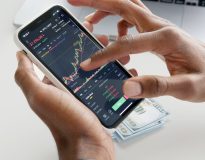With many of us itching to return to “business as usual,” health experts say contact tracing is critical, but privacy problems have stymied this effort. Adoption rates are often dismal in countries and regions with contact-tracing apps: In the U.S., for instance, individual states’ adoption rests at 1% to 10% (with some states striking down plans for an app altogether), and adoption is slower than anticipated across Europe and Asia.
This low adoption rate makes sense given privacy concerns. Though widespread contact tracing could help your employees get back in the office sooner, workers are skeptical — and the privacy risks are real.
Contact Tracing Is Imperfect but Necessary
Case in point: 68% of respondents to a survey by SHRM said they thought contact tracing would help employers curb COVID-19, but only about half thought the benefits outweighed data privacy concerns.
Blockchain can ease worry about contact tracing.
Blockchain could help ease misgivings, but it’s just one piece in a patchwork of practices that will be needed to bring employees back into the physical work environment.
There’s a whole host of reasons why countries have been slow to roll out large-scale digital contact tracing, and a big one is people’s unwillingness to disclose personal health information. Fewer than half of Americans say they’re comfortable sharing their location data for contact tracing, and those low participation rates render apps virtually useless.
Where Privacy Comes Into Play
Unfortunately, contact-tracing technology does carry privacy risks. And if they’re not bound by strict privacy rules such as the GDPR, apps aren’t always held to overarching standards.
The trouble comes when people test positive. When testing positive a person’s personal data needs to be uploaded to a central server for others to download and use for contact-tracing maps. This action causes users’ data to be vulnerable to trajectory attacks and information reconstruction.
If you have your employees use a contact-tracing app and share their data, you as an employer must align with state, regional, and federal laws related to the type of data you’re collecting. And while some areas have expanded privacy laws that protect individuals’ geolocation data (California, for example, has standards requiring disclosure, the ability to opt-out, and deletion obligations), other areas of the country are more lax.
Blockchain Could Certify Testing and Immunization
However, digital contact tracing is still the best solution, and blockchain could play a role in keeping user data secure and preventing trajectory attacks. In fact, researchers at the University of Glasgow have already put this to the test, showing promise for the future: They hope to win over users with their app BeepTrace, which uses blockchain to keep digital contact tracing decentralized, private, and secure.
In addition to wider contact tracing, we need an easy, verifiable way to prove that people have tested negative for COVID-19 before entering a workplace or traveling.
This would require digital credentials that people feel safe sharing with multiple parties: their employer, TSA agents, even a bus driver.
Looking Toward Blockchain-Powered Digital Health Wallets
A digital health wallet that uses blockchain could be part of the solution.
With a digital health wallet, users could share their test results or immunization records without the risk of exposing sensitive personal data.
Here’s how it could work: An individual who wants to get tested for COVID-19 would share her blockchain-powered digital ID with her healthcare provider.
After the test, the provider would upload that patient’s test result and link it to her digital credential, which has cryptographic proofs associated with it to enable easy verification. The test result is then issued directly into the patient’s health wallet.
At her workplace, an employee can scan her QR code with a verifying application on a computer or phone. This would extract the information from the credential and check the proofs on the blockchain before displaying her test result.
The Benefits of Decentralization
With the user’s COVID-19 status completely decoupled from her personal information, there’s no chance of reconstruction. The data could be moved off-chain (to a private database), allowing it to be in direct control of the owner at all times and allowing deletion when it’s obsolete. For this to work, healthcare providers would need to provide wallet-ready COVID-19 test results and proof of immunization.
Blockchain is great for sharing this data because it creates a decentralized platform that ensures a user’s data stays private.
Yes, this would be an unprecedented feat of collaboration between public health agencies and healthcare providers. But it would also allow people to get back to work safely and help reopen our economy.
What About Paper Records?
Of course, traditional paper records are another way employees and workplaces can verify test and immunization credentials. Still, it requires an extra step — verification by a third party — to make sure these records are authentic.
However, during the early stages of blockchain adoption, this step is probably necessary until labs and healthcare systems are fully integrated into this higher-tech solution.
Health Credentials Are Only One Part of Keeping Employees Safe
We now have viable vaccines, but it’s unlikely that nonessential workers will be vaccinated before spring ends (or even summer). If you’re thinking of bringing your employees back to the office before then, you need a plan to deal with individuals who haven’t been inoculated.
It’s critical to conduct daily health screenings for all employees before they enter the workplace. Your office also needs to be reconfigured to allow for adequate social distancing. It goes without saying that infected individuals (or those exposed and awaiting test results) must quarantine at home.
Lastly, only a combination of actions will ensure our offices are safe: We need mass testing, a way to share COVID-free credentials, and for people to feel that their data is truly private when participating in contact tracing. If we could get just 60% of the population to opt-in, we could curb the spread of the virus.
Creating a Safer Workplace Culture
Blockchain for data privacy isn’t a magic bullet — it’s just one tool of many we’re going to need in our arsenal to return to work safely. As your employees start coming back to the office, the best thing you can do is exercise vigilance and create a culture where your workers take personal responsibility for public health and safety.
Image Credit: shridhar gupta; unsplash










